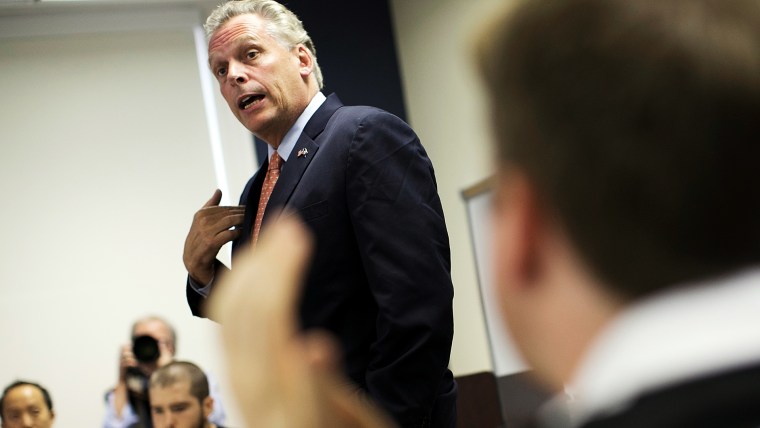For proponents of voting restrictions, last week was one to forget. On Tuesday, for example, a federal court issued a ruling mitigating some of the voter-ID restrictions imposed by
Wisconsin Republicans. A day later, the 5th Circuit Court of Appeals shot down part of
Texas' voter-suppression campaign. By Friday, a federal court issued an injunction blocking a
Michigan GOP measure banning straight-ticket voting in the state.
All things considered, it was the kind of successful week voting rights advocates haven't seen in a while.
There was, however, an important exception. The
Washington Post reported on a breakthrough voting rights policy in Virginia that was unexpectedly reversed by a federal court.
Gov. Terry McAuliffe's decision to restore voting rights to more than 200,000 felons violates Virginia's constitution, the state Supreme Court ruled Friday, dealing a major blow to the Democratic governor with implications for the November presidential race in the crucial swing state. In a 4-to-3 decision, the court ruled that McAuliffe overstepped his clemency powers by issuing a sweeping order in April restoring rights to all ex-offenders who are no longer incarcerated or on probation or parole.
Regular readers may recall
our coverage of this in April, when the Democratic governor, taking aim at a law with
ugly and racist roots, issued a sweeping order to restore the voting rights of more than 200,000 former felons. It was
described at the time as "the biggest-ever single action taken to restore voting rights in this country."
Virginia Republicans filed suit almost immediately, and last week, they prevailed. The court found that the governor can restore voting rights for former felons, but it must be done on a case-by-case basis, not through one sweeping executive action.
Which means that Terry McAuliffe is now moving on -- to Plan B.
As ambitious as this may sound, the New York Times
reports that the governor is prepared to
individually sign "about 206,000 restoration orders for ex-felons, including 13,000 who had registered after his April order."
Christina Nuckols, Mr. McAuliffe's deputy communications director, said in a statement on Monday that the governor intended to comply with the court's ruling and would "expeditiously" review the 13,000 former felons who had already registered, then address the remainder. To carry that out, the governor would have to sign roughly 385 orders a day until the end of his term. That pace could rankle skeptical Republicans, one of whom warned on Monday that they would go back to court if Mr. McAuliffe tried to accomplish by autopen what the court denied him last week.
Watch this space.
